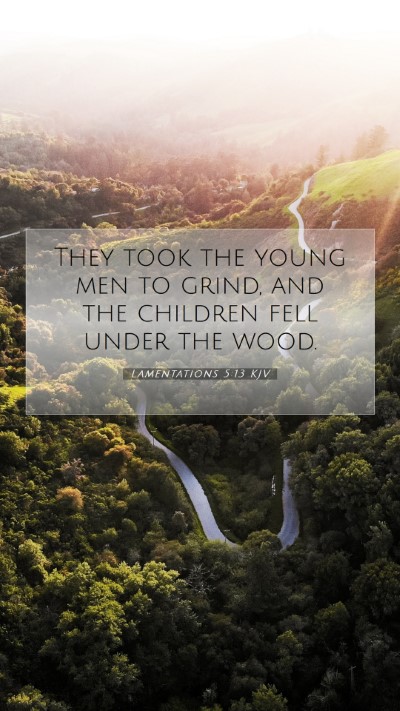Lamentations 5:13 - Bible Verse Meaning and Interpretation
Lamentations 5:13 states: "They took the young men to grind, and the children fell under the wood." This verse captures a poignant image of suffering and hardship, reflecting the dire consequences faced by a people in distress. Below is a detailed analysis combining insights from esteemed biblical commentaries.
Contextual Background
The Book of Lamentations, attributed to the prophet Jeremiah, is a poetic response to the destruction of Jerusalem. This verse illustrates the significant societal breakdown and the exploitation of the vulnerable, particularly the young and the children, during this calamity.
Summary of Insights
-
Matthew Henry's Commentary:
Matthew Henry emphasizes the grave situation of the Israelites post-captivity. The grinding, often seen as a task associated with women, indicates a demographic shift as women are compelled to partake in heavy labor as a result of the community's devastation. This illustrates not just physical suffering but a significant social upheaval.
-
Albert Barnes' Notes:
Barnes points out that this imagery serves to highlight the vulnerability of the children amidst nationwide tragedy. The harvesting of youth for labor captures the essence of the communal loss of innocence and the tragic reallocation of societal roles. It depicts a loss of dignity and the harsh conditions imposed upon them.
-
Adam Clarke's Commentary:
Clarke provides a vivid elaboration on the physicality of the verse. The action of grinding symbolizes the hard labor imposed on the young men, while the mention of the children signifies their exposure to hardships beyond comprehension. His analysis suggests that the weight of oppression is heavy upon the innocent, forming a cycle of pain that reverberates through generations.
Thematic Elements
Several themes emerge from Lamentations 5:13, which are crucial for understanding its broader implications in Scripture:
- Suffering and Despair: The verse encapsulates the broader experience of grief and loss that pervades the Book of Lamentations, inviting readers to engage with the emotional turmoil that arises from communal sin and divine judgment.
- The Role of the Vulnerable: Highlighting the plight of young men and children serves as a reminder of societal responsibility for the weak and innocent. It calls for a compassionate response amidst suffering.
- Redemption and Restoration: While the immediate context is bleak, the overarching narrative of the Bible leads toward themes of hope, redemption, and God's faithfulness to restore those in anguish.
Application of the Verse
Applying Lamentations 5:13 to daily life encourages believers to reflect on the conditions of the vulnerable within society. It prompts questions such as:
- How can we serve and protect those who are suffering?
- What roles do we play in alleviating the burdens of those around us?
- In what ways does this verse challenge us to address injustices among our communities?
Related Bible Cross References
- Lamentations 1:18 - "The Lord is righteous; for I have rebelled against his commandment." - This verse resonates with the themes of guilt and suffering.
- Ezekiel 18:30 - "Therefore I will judge you, O house of Israel, every one according to his ways, saith the Lord God." - Highlights themes of judgment and personal responsibility.
- James 1:27 - "Pure religion and undefiled before God and the Father is this, To visit the fatherless and widows in their affliction." - Stresses the importance of caring for the marginalized.
Final Thoughts
Understanding Lamentations 5:13 invites readers to immerse themselves in its historical context, engaging with the emotional depth of its lament. The exhortations to act justly, love mercy, and walk humbly resonate deeply within our modern context, urging us to be advocates for the voiceless and engage in meaningful biblical discussions.
For those seeking Bible verse meanings, Bible verse interpretations, and Bible study insights, this verse serves as a profound reminder of the realities that accompany divine justice and societal sin. As you explore its depths, consider how this scripture can inform your understanding of community, accountability, and hope.


